Address
AVSSO 2242 SE 171st AVE Portland Oregon USA 97233
Work Hours
Monday to Friday: 7AM - 7PM
Weekend: 10AM - 5PM
Address
AVSSO 2242 SE 171st AVE Portland Oregon USA 97233
Work Hours
Monday to Friday: 7AM - 7PM
Weekend: 10AM - 5PM
Discover 15 must-grow magical herbs for your witch's garden. Beginner-friendly guide to cultivating these enchanting plants.

Creating a witch’s garden is a wonderful way to connect with nature and enhance your magical practices. For beginners, growing one’s own magical plants can be a rewarding experience, allowing for a deeper understanding of herbal magic.
Growing beginner-friendly herbs is an excellent starting point. These plants are not only easy to care for but also provide a foundation for various magical rituals and spells. By cultivating a witch’s garden, individuals can tap into the natural world, fostering a sense of harmony and balance.
Creating a witch’s garden is a journey into the heart of nature’s magic and our connection to it. This practice is deeply rooted in ancient traditions that have been passed down through generations.
Herbal magic has its roots in ancient cultures where plants were not only used for healing but also for their spiritual and magical properties. The use of magical herbs in rituals and spells was a common practice, believed to enhance the practitioner’s connection to nature and the divine.
Growing your own magical plants allows you to cultivate a personal and intimate relationship with nature. By nurturing these plants, you infuse them with your intentions and energy, making their magical properties more potent and personal.
A plant is considered “magical” not just because of its inherent properties, but also due to the intentionality and energy invested in its cultivation. The belief in a plant’s magical properties is often tied to its historical use in herbal magic and the cultural significance attributed to it.
In conclusion, cultivating your own witch’s garden is a meaningful way to engage with magical herbs and herbal magic. By understanding the ancient traditions and the significance of growing your own magical plants, you can deepen your practice and connection to the natural world.
Cultivating magical herbs at home can be a deeply rewarding experience, offering numerous benefits for both novice and experienced practitioners. By growing your own herbs, you can enhance your magical practice and connect with nature on a deeper level.
Growing magical herbs intentionally fosters a spiritual connection with the natural world. This connection can amplify the effectiveness of your spells and rituals, as you’re directly involved in the cultivation of the plants used.
Sustainable gardening practices ensure that your magical herbs are grown and harvested in an environmentally friendly manner. This approach not only preserves the ecosystem but also guarantees a consistent supply of high-quality herbs.
Growing your own magical herbs can be cost-effective, as it eliminates the need to purchase them from external sources. Additionally, having a personal garden makes these herbs more accessible for various magical practices.
| Benefit | Description |
|---|---|
| Spiritual Connection | Enhances magical practice through intentional growing |
| Sustainability | Environmentally friendly gardening and harvesting |
| Cost-Effectiveness | Reduces the need for external purchases |
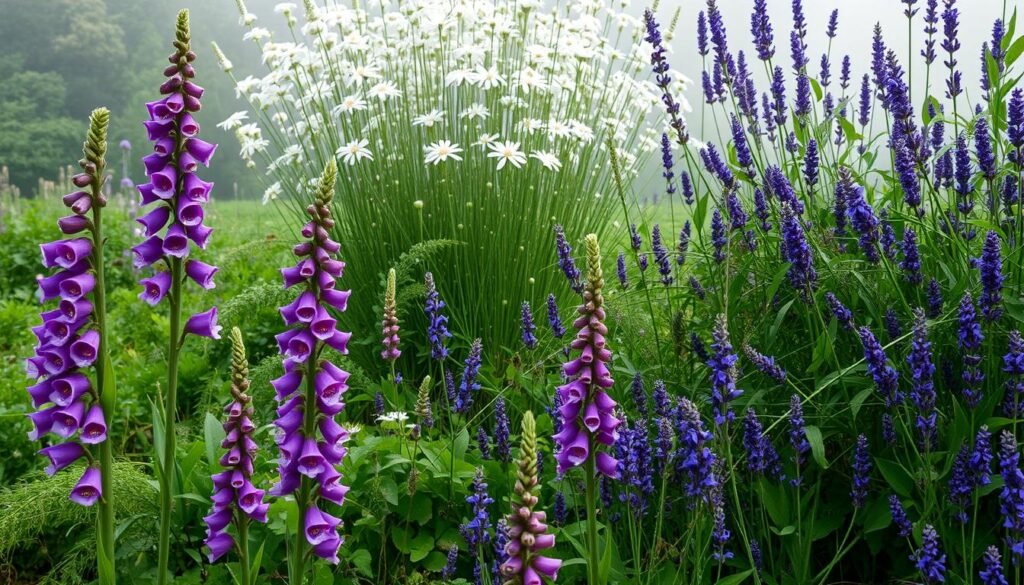
A witch’s garden is a haven where magic and nature intertwine, and setting it up is the first step in your magical journey. As you begin, consider the space available to you, whether it’s a small windowsill or a spacious backyard.
When it comes to growing magical herbs, space is not a limitation. You can start with a few pots on a windowsill or expand to a larger area in your backyard. The key is to ensure that your plants receive adequate sunlight and care.
To get started, you’ll need some basic gardening tools and supplies. These include:
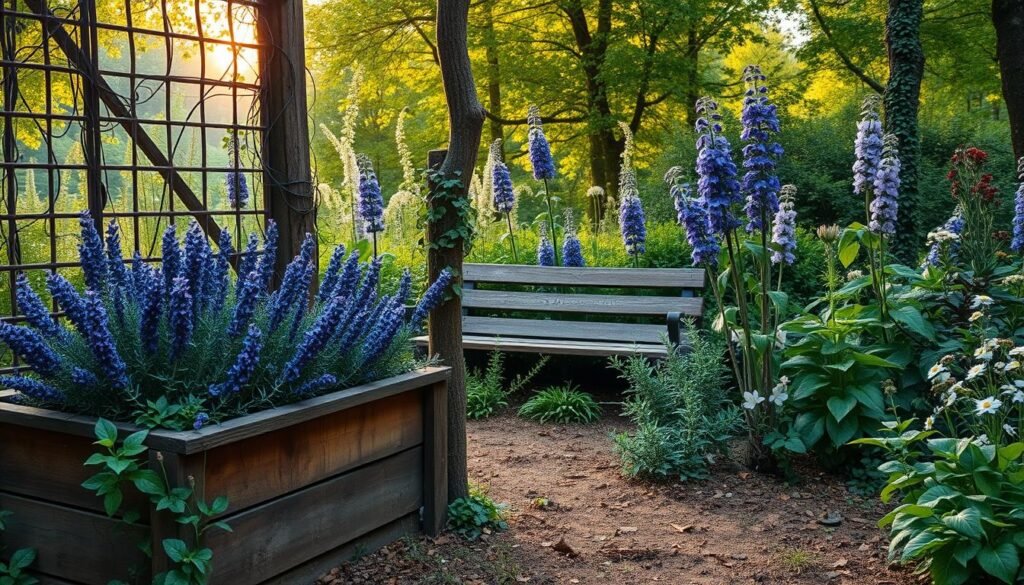
Understanding your local growing zone and the seasons is crucial for the success of your witch’s garden. Research which magical herbs thrive in your area and plan your planting schedule accordingly.
Some magical herbs are hardy and can tolerate frost, while others are more sensitive to temperature changes.
The moon’s cycles can significantly influence the growth of your magical herbs. Planting during the appropriate moon phase can enhance the potency and vitality of your plants.
By aligning your gardening activities with the moon’s cycles, you can deepen your connection with nature and enhance your magical practice.
For those new to witchcraft, understanding and utilizing protective herbs like rosemary, sage, and basil can be a powerful step in their magical practice. These herbs are not only easy to grow but also offer a range of protective qualities that can enhance your rituals and daily life.
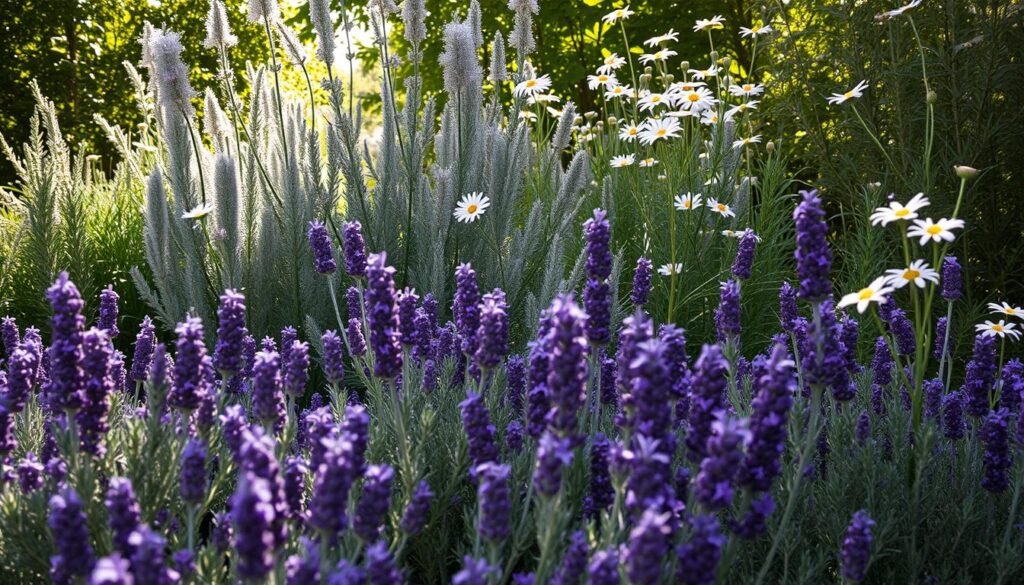
Rosemary is a versatile herb known for its protective qualities. It is often used in smudging rituals to purify and protect a space.
Rosemary is believed to offer protection against negative energies and to improve mental clarity. It can be used in spells for protection, memory, and purification.
“Rosemary is for remembrance; pray you, love, remember.” – William Shakespeare, Hamlet
Sage is renowned for its cleansing properties and is often used in rituals to drive out negative energies.
Sage is used for its protective and cleansing properties. It is believed to promote healing, wisdom, and purification.
| Herb | Magical Property | Use in Rituals |
|---|---|---|
| Rosemary | Protection, Memory | Smudging, Protection Spells |
| Sage | Cleansing, Healing | Cleansing Rituals, Healing Spells |
| Basil | Prosperity, Protection | Prosperity Spells, Protection Charms |
Basil is not only a culinary delight but also a powerful magical herb used for protection and prosperity.
Basil is believed to attract prosperity and protect against negative energies. It can be used in spells for wealth, love, and protection.
By incorporating these protective magical herbs into your practice, you can enhance your spiritual journey and create a safer, more positive environment for your rituals and daily life.
Healing herbs have been a cornerstone of magical and medicinal practices for centuries, offering a natural path to wellness. These plants not only provide physical health benefits but also contribute to emotional and spiritual healing.
Lavender is renowned for its calming effects and is often used in spells and rituals for peace and relaxation.
Lavender thrives in well-drained soil and full sun. It’s relatively low maintenance and can be harvested in the summer months.
Use lavender in dream pillows to promote restful sleep or in calming spells to soothe the mind.
Chamomile is another herb known for its soothing properties, often used in teas and infusions to calm the nerves.
Chamomile prefers well-drained soil and partial shade. It’s an easy-to-grow herb that can be harvested in the late summer.
Chamomile can be used in spells for relaxation and to promote a peaceful environment.
Calendula, or pot marigold, is valued for its healing properties, particularly in skin care and rituals for restoration.
Calendula grows well in most soils and full sun. It’s a hardy annual that can be harvested throughout the growing season.
Use calendula in healing spells or as an addition to herbal remedies to enhance their restorative properties.
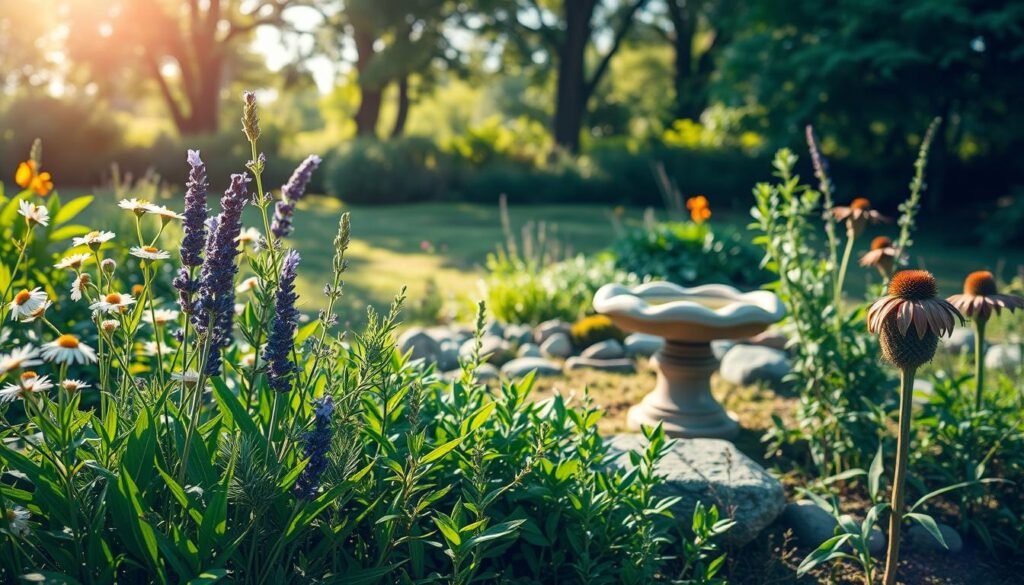
| Herb | Growing Conditions | Magical Use |
|---|---|---|
| Lavender | Well-drained soil, full sun | Calming, dreamwork |
| Chamomile | Well-drained soil, partial shade | Soothing, relaxation spells |
| Calendula | Most soils, full sun | Healing, restoration |
Cultivating a garden with herbs like mint, rose, and thyme can be a potent way to invite love and abundance into your life. These herbs have been used for centuries in various magical practices to attract positive energies and foster a deeper connection with nature.
Mint is renowned for its ability to attract abundance and prosperity. Its refreshing scent is not only invigorating but also believed to draw positive financial energies.
To grow mint effectively, it’s essential to provide it with moist soil and partial shade. It’s a hardy plant that can thrive in various conditions, but it does best in cooler, wetter environments. Be sure to contain it, as mint can spread quickly.
In magical practices, mint is used to enhance prosperity and clarity. It’s often used in spells for financial success and can be added to prosperity sachets or used in ritual baths to attract abundance.
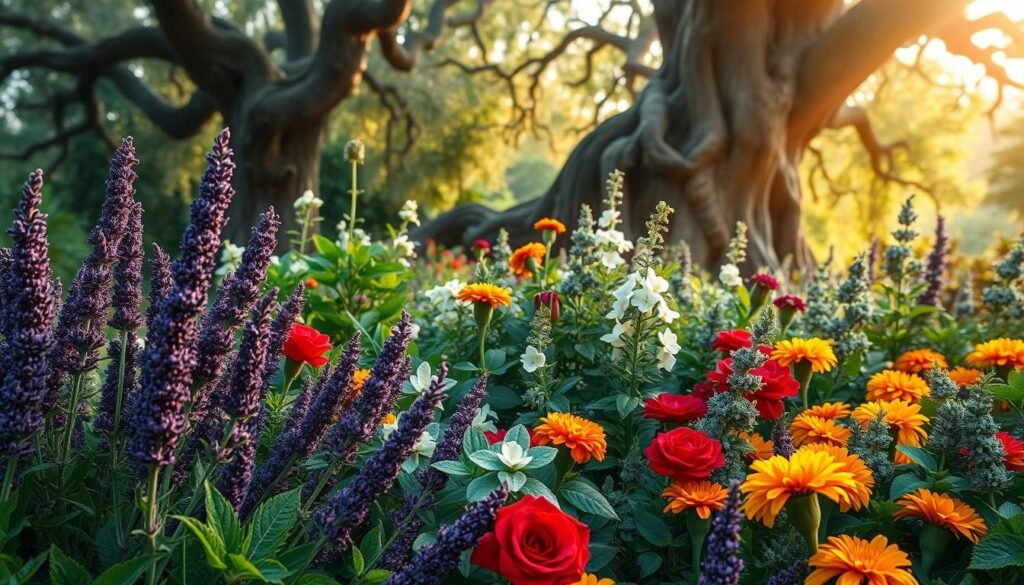
Rose is a classic symbol of love and is used in various magical rituals to attract romantic energies. Its beautiful fragrance is believed to open the heart and foster deeper emotional connections.
Rose bushes require well-drained soil and full sun to thrive. They need regular pruning to encourage new growth and more blooms. There are many varieties, so choose one that suits your climate and desired level of maintenance.
In magical practices, rose petals are often used in love spells, added to ritual baths, or made into potpourri to attract loving energies. Rose is believed to promote emotional healing and foster a sense of self-love.
Thyme is not only a culinary herb but also a powerful magical tool. It’s believed to enhance courage and confidence, making it a valuable addition to any witch’s garden.
Thyme prefers well-drained soil and full sun. It’s a low-growing, spreading herb that can be used as a ground cover. Regular pruning encourages new growth and prevents it from becoming woody.
In magical practices, thyme is used to promote courage and confidence. It’s often added to ritual incense or used in spells for protection and healing.
| Herb | Magical Property | Growing Condition |
|---|---|---|
| Mint | Abundance, Prosperity | Moist soil, Partial shade |
| Rose | Love, Emotional Healing | Well-drained soil, Full sun |
| Thyme | Courage, Confidence | Well-drained soil, Full sun |
Certain magical herbs are renowned for their capacity to facilitate divination and intensify dream experiences. These herbs have been used for centuries in various magical practices, enhancing the user’s ability to gain insight and understand the subconscious mind.
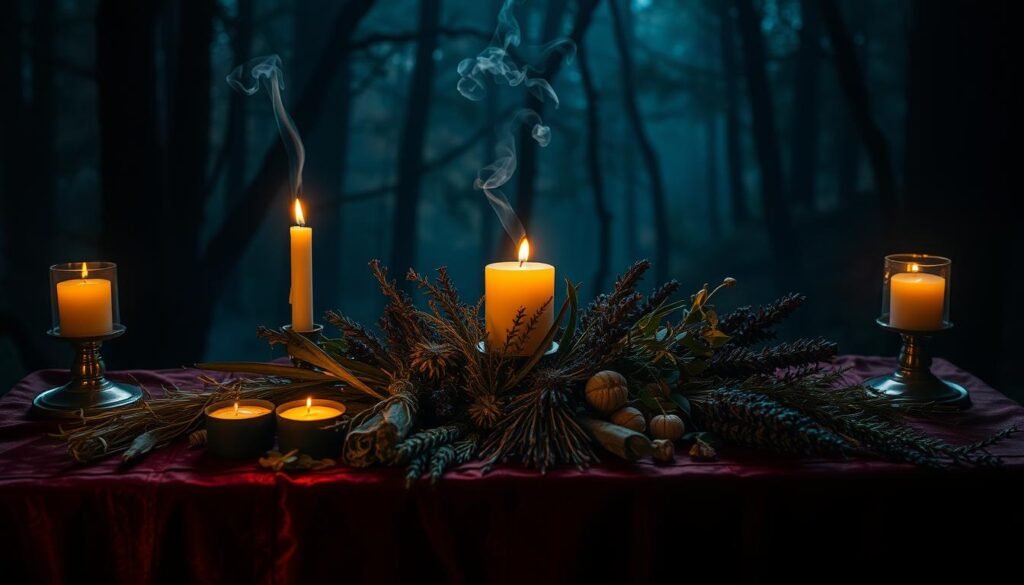
Mugwort is a highly revered herb in the realm of dreamwork and divination. It’s known to enhance psychic abilities and promote vivid dreams.
Mugwort thrives in well-drained soil and partial shade. It’s a hardy perennial that can grow quite tall, so it may require staking. Regular pruning helps maintain its shape and encourages new growth.
Mugwort is often used in dream pillows and sachets to enhance dream recall and intensity. It’s also burned as incense to purify and protect the practitioner during divination rituals.
Wormwood is another powerful herb associated with divination. It’s believed to enhance the user’s clairvoyant abilities and protect against negative energies.
Wormwood prefers dry, well-drained soil and full sun. It’s a drought-tolerant perennial that requires minimal care, making it ideal for busy practitioners.
Wormwood is often used in protective spells and divination rituals. It’s believed to enhance the user’s ability to see into the future and understand hidden truths.
Lemon balm is a versatile herb used in both culinary and magical practices. It’s known to enhance psychic abilities and promote a sense of calm and clarity.
Lemon balm thrives in moist, well-drained soil and partial shade. It’s a fast-growing perennial that may require regular pruning to keep it under control.
Lemon balm is often used in teas and infusions to enhance psychic abilities and promote relaxation. It’s also used in spells for love, healing, and protection.
By incorporating these herbs into their practice, individuals can deepen their understanding of divination and dreamwork, enhancing their magical journey.
As your magical herbs reach maturity, understanding when and how to harvest them is crucial for maximizing their potency. The timing and method of harvesting can significantly impact the quality and effectiveness of your magical preparations.
Harvesting at the right moment is key to capturing the peak potency of your magical herbs. For most herbs, this means harvesting during the early morning, just after the dew has dried but before the heat of the day. The lunar cycle can also influence the potency of your herbs; for instance, herbs harvested during the full moon are believed to be particularly potent for releasing and letting go.
Table: Best Harvesting Times for Common Magical Herbs
| Herb | Best Time to Harvest | Lunar Influence |
|---|---|---|
| Lavender | Peak bloom | New Moon |
| Sage | Before flowering | Full Moon |
| Mint | Before flowering | Waxing Crescent |
To preserve the potency of your harvested herbs, proper drying and storage are essential. Air drying is a simple and effective method, where herbs are tied in small bunches and hung upside down in a warm, dry, dark place. Once dry, store the herbs in airtight containers to protect them from light and moisture.
“The art of drying herbs is not just about preserving them, but also about capturing their essence and potency for future use.”
Once your herbs are harvested and dried, you can begin preparing them for magical use. Simple preparations include making teas, infusions, and smudging blends. For example, a calming tea can be made by steeping dried chamomile flowers in hot water, while a protective smudging blend might include sage, rosemary, and a touch of lavender.
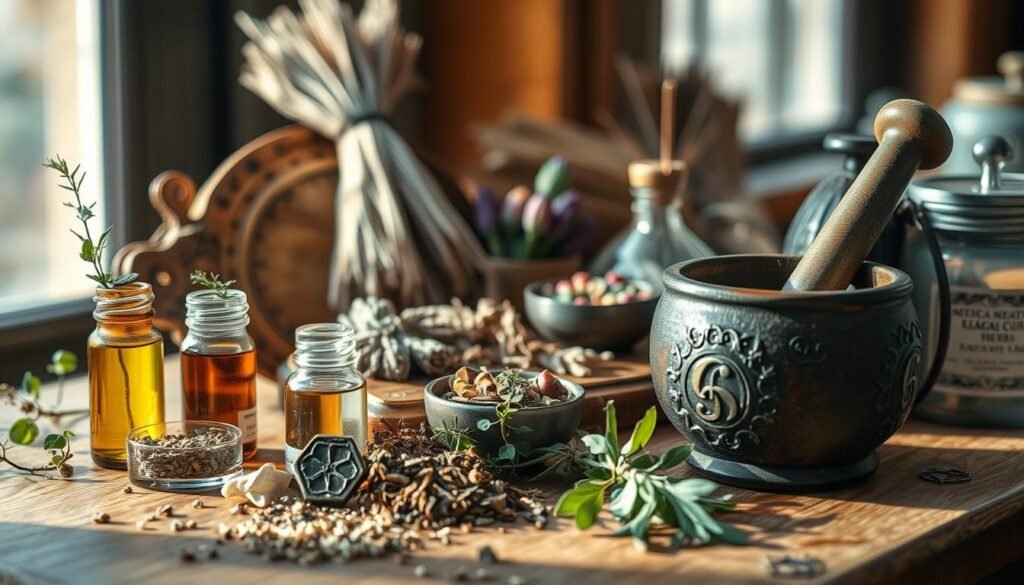
When working with magical herbs, it’s crucial to approach their use with respect and gratitude. This includes being mindful of the environmental impact of your harvesting practices and ensuring that you are not over-harvesting. Practicing gratitude through rituals or simple acknowledgments can enhance your connection with the natural world and the magical properties of the herbs.
By following these guidelines for harvesting and using your magical herbs, you can deepen your practice and enjoy the many benefits that these plants have to offer.
Cultivating a witch’s garden is a journey that not only connects you with nature but also deepens your magical practice. By growing and nurturing magical herbs, you foster a magical connection that enhances your spiritual growth and intentions.
Nurturing herbs like rosemary, sage, and lavender allows you to tap into their unique properties, from protection and healing to divination and love. As you tend to your garden, you cultivate a sense of mindfulness and intention, aligning your energy with the natural world.
As you continue on your path, remember that the true magic lies not just in the herbs themselves, but in the care and attention you devote to them. By embracing this holistic approach, you’ll find that your magical connection grows stronger, enriching your practice and your life.
Magical herbs are plants believed to possess spiritual or mystical properties that can be used in various magical practices, such as spellwork, rituals, and divination.
Choose magical herbs that align with your intentions and needs, such as protection, healing, love, or prosperity. Consider factors like climate, growing conditions, and the herb’s specific magical properties.
Yes, many magical herbs can be grown indoors, such as on windowsills or in pots. Ensure they receive sufficient light and are cared for according to their specific needs.
Harvest magical herbs at the right time, usually during the peak of their potency, and use techniques like cutting or pinching to minimize damage to the plant.
Magical herbs can be used in various ways, including in spells, rituals, teas, infusions, and as offerings. They can also be used for medicinal purposes, such as making herbal remedies.
Store magical herbs in a cool, dry place, away from direct sunlight and moisture. Use airtight containers, such as glass jars, to preserve their potency.
Yes, certain magical herbs like rosemary, sage, and basil are believed to offer protection against negative energies and can be used in spells and rituals for protection.
Yes, be aware of potential allergic reactions, interactions with medications, and the toxicity of certain herbs. Handle magical herbs with care, and research their safe use before incorporating them into your practice.